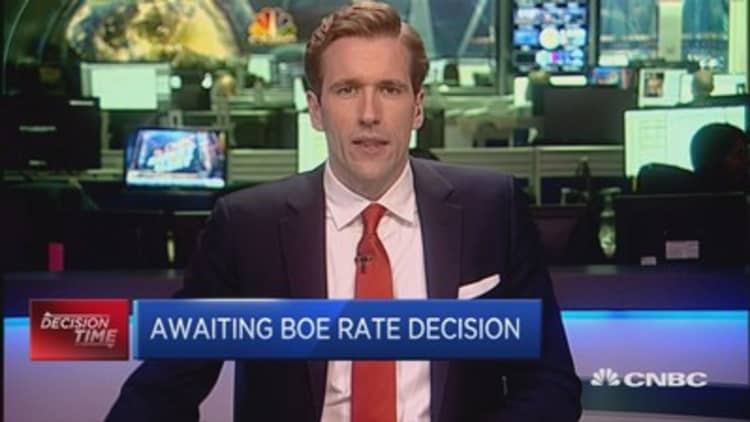
The U.K. central bank kept monetary policy unchanged on Thursday, as analysts pondered when interest rates might finally be raised and the possible impact of a referendum on European Union (EU) membership.
The Bank of England (BoE) held its benchmark interest rate at a record low of 0.5 percent, where it has remained since March 2009. It also kept the size of its bond purchases under the quantitative easing (QE) program at £375 billion ($579 billion).
The policy announcement comes one month after the incumbent Conservative Party returned to power in the U.K.—an election result that surprised and reassured markets, which had not expected the center-right party to gain a working majority.
"It's 'back to business' for a BoE now able to look past May's election and the bulk of the oil price fall," said Neil Williams, chief economist at Hermes Investment Management, in a research note on Thursday.
"The economic recovery is broadening, yet the Monetary Policy Committee's adherence to a 2 percent CPI (consumer price index) inflation target makes a rate hike difficult before 2016."
Analysts broadly expect the bank to raise rates in the first half of 2016—after the U.S. Federal Reserve, but some way before the European Central Bank.
Brexit risks
Williams warned, however, that should the Conservatives' promised referendum on EU membership see the Britain quit the union—a so-called Brexit—there was a distant possibility that the BoE might opt to resurrect QE.
Read MoreCentral banking: CNBC Explains
"It is not beyond reason that dealing with a Brexit and a hit to growth may in extremis need the BoE to again be the biggest sponsor of gilts, by reactivating QE," he said.
"In the event of Brexit (which I see only as a risk case), long-term conventional gilts may benefit initially from the perceived hit to growth. But this could be short lived, given that more than one-third is backed by international investors sensitive to currency and ratings risk."
The Chancellor of the Exchequer, George Osborne, could make reference to the EU referendum, which is slated to be held by the end of 2017, when he gives his first post-election economic budget on Wednesday July 8.
More from the bank's latest policy meeting will be revealed on June 17, when the minutes will be published.

